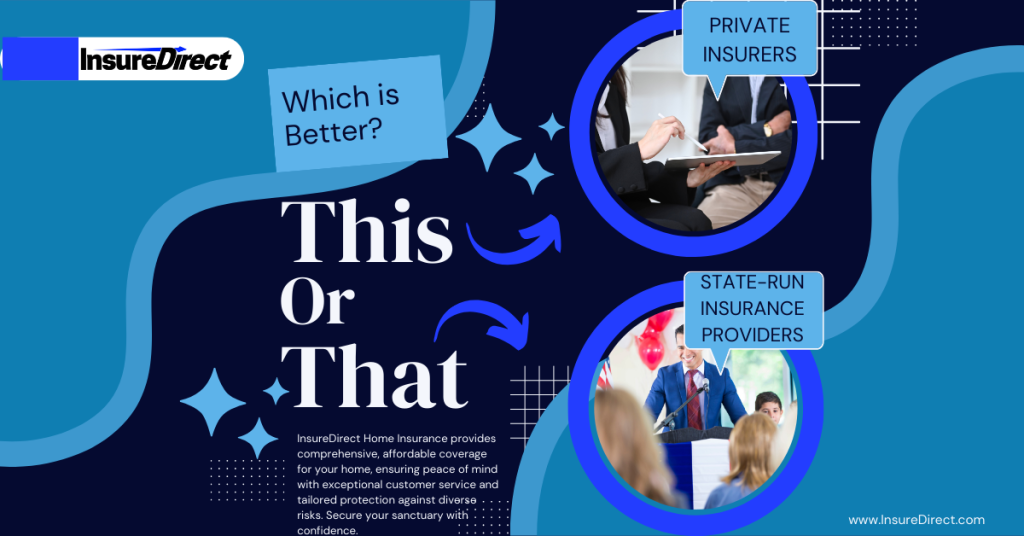Why Homeowner Insurance
In a world where storms don’t announce themselves, and disasters can happen when you least expect, having homeowners’ insurance—well, it’s kinda essential, isn’t it? Protecting your home, your belongings, maybe even your peace of mind, is tricky without it. You could argue that the insurance landscape today is a blend of financial power and bureaucratic limitations. In this piece, we’ll dive into the reality of homeowners coverage: private insurers versus state-run providers, and the best ways to guard against the unexpected.
Private Insurers: Strong, But Not Untouchable
Private insurers, like InsureDirect, often sit atop a financial hill. They have the cash reserves, the expertise, and the experience to handle claims even when the skies unleash chaos. You see, reports from the Insurance Information Institute show that collectively, private insurers held $564 billion in surplus at the start of this year. Think about that—half a trillion dollars just sitting there, ready to cover homes, belongings, sometimes heartbreak.
Yet, despite this wealth, the market isn’t always kind. The first quarter was rough: equity markets fluctuated, unsettling some insurers’ surplus. But still, compared to their state-run cousins, private insurers remain sturdy. Their ability to handle large-scale catastrophes is tested time and time again, but their track record mostly holds. Claims? Paid. Emergencies? Managed.
Sometimes, and reputation though, even the titans stumble. A sudden string of disasters, or misjudged risk models, can shake their foundation. But if you want stability, reliability, and someone who knows how to calculate the math behind a storm, private insurers are tough to beat.
State-Run Insurance: Struggling to Keep Up
State-run insurers, like Irene May Hurt State Run Insurance (yes, really), are a different story. Operating mostly in the residual market, they often offer premiums that don’t align with actual risk. And surplus? Frequently absent. So when Hurricane Irene—or any calamity—strikes, the bills stack up faster than they can handle.
It’s not that they don’t try. Limited budgets, political oversight, and conservative investment strategies restrict them. The Insurance Information Institute warns, bluntly: state-run providers might not survive large-scale disasters without external aid. They cover what they can, sure, but in major catastrophes, policyholders might be left in limbo.
The Reality of Natural Disasters
Hurricane Irene in 2011 serves as a cautionary tale. $10 billion in damages. Wind, flood, storm surges—chaos across multiple states. While private insurers managed to pay most claims efficiently, state-run carriers found themselves stretched beyond limits.
And it’s not just hurricanes. Wildfires, floods, tornadoes—more frequent, more severe. The insurance world reacts, sometimes slowly. Your coverage choice today might dictate whether your home is rebuilt or left in disrepair tomorrow.
Evaluating Your Options
So, what should a homeowner do? First, don’t underestimate financial strength. Look beyond fancy brochures. Ask: can this insurer survive my worst-case scenario? Private insurers, backed by large groups like Combine Insurance, offer that safety net. InsureDirect, under Combine’s wing, specializes in this: prompt claims processing, tailored policies, and the reassurance that comes from deep pockets.
State providers? They might be tempting if premiums are lower—but understand the trade-off. Limited funds can mean delayed claims, or worse, denied coverage in extreme events.
New Considerations: Beyond Standard Policies
Homeowners insurance isn’t one-size-fits-all. Consider:
Flood Insurance: Many standard policies exclude floods. Check your coverage or buy extra.
Earthquake Protection: In seismically active areas, earthquakes can devastate without notice.
Umbrella Insurance: Provides extra liability coverage above your standard limits.
Specialty Items: Jewelry, art, watercraft—these often need separate coverage.
And don’t forget inflation. Rebuilding costs rise yearly. Policies that don’t account for this might leave you underinsured.
How to Choose Wisely
Financial Stability: Look at surplus, claim-paying ability, and historical performance.
Coverage Options: Check if policies cover natural disasters relevant to your region.
Claims Handling: Speed, transparency, andreputation matter.
Cost vs. Value: Cheapest isn’t always best. Assess real protection against premium price.
Private insurers often score highly across these categories, making them appealing. State-run insurers, while sometimes necessary, carry additional risk that must be weighed carefully.
InsureDirect: A Case for Trust
InsureDirect stands out. Backed by Combine Insurance Group, they bring financial muscle and policy flexibility. They offer everything from basic homeowner coverage to specialized products like flood or jewelry insurance.
Getting a quote is straightforward. Visit their website or contact their corporate office in Lansdale, Pennsylvania. Questions? Support teams are ready to assist with your coverage needs.
Expanding Coverage Horizons
Insurance today isn’t just about walls and roofs. Consider:
Commercial/Business Property Insurance: Protect your side business.
Professional Liability: Safeguard against work-related lawsuits.
Workers’ Compensation: If you employ others, it’s essential.
Auto and Watercraft Insurance: Complete household protection.
Comprehensive coverage means thinking beyond the basics. When paired with private insurers’ strong financial footing, homeowners can sleep easier—even during a storm warning.
Final Thoughts
Homes are more than structures; they’re sanctuaries. Picking the right insurance isn’t just paperwork—it’s an investment in stability and peace of mind. Private insurers like InsureDirect offer the kind of resilience state-run providers often struggle to match. For homeowners, that difference can be the difference between swift recovery and prolonged financial stress.
Secure your home, protect your belongings, and choose coverage that actually stands up when nature tests it. With proper planning, insurance doesn’t just cover losses—it preserves your life’s work, your memories, your sanctuary.
Get in Touch with InsureDirect
Website: InsureDirect.com
Headquarters: 618 South Broad Street, Lansdale, PA 19446
Email: contact@insuredirect.com
Phone: (800) 807-0762 ext. 602
Protect what truly matters — your business, your people, and the reputation you’ve worked hard to build.

